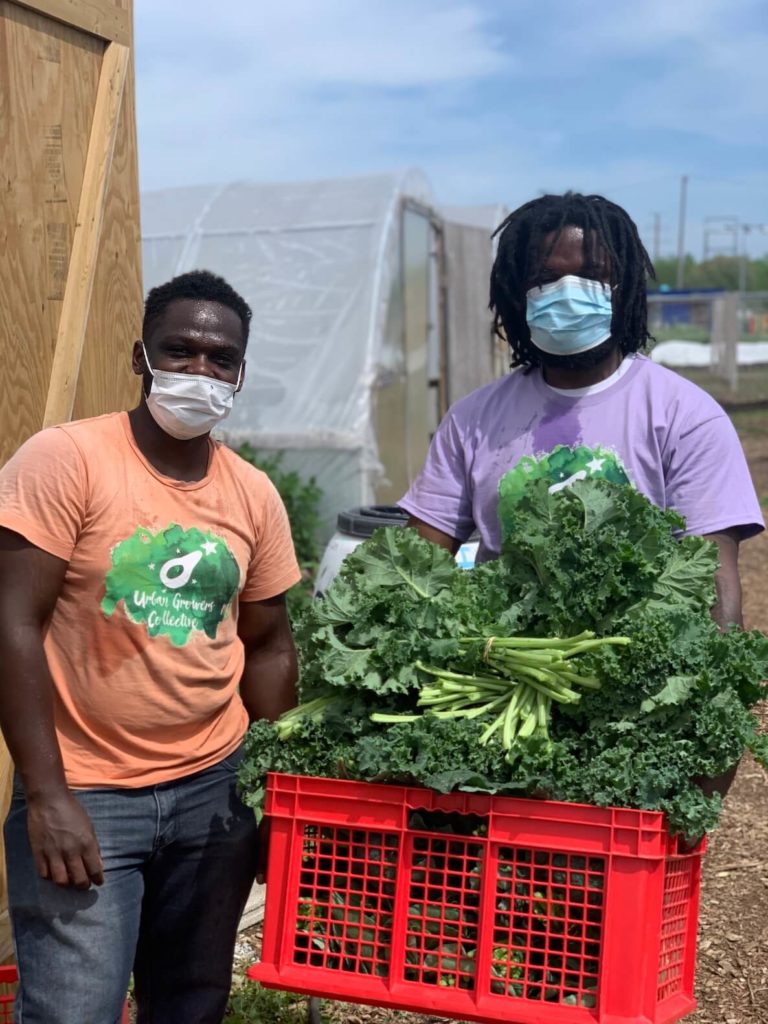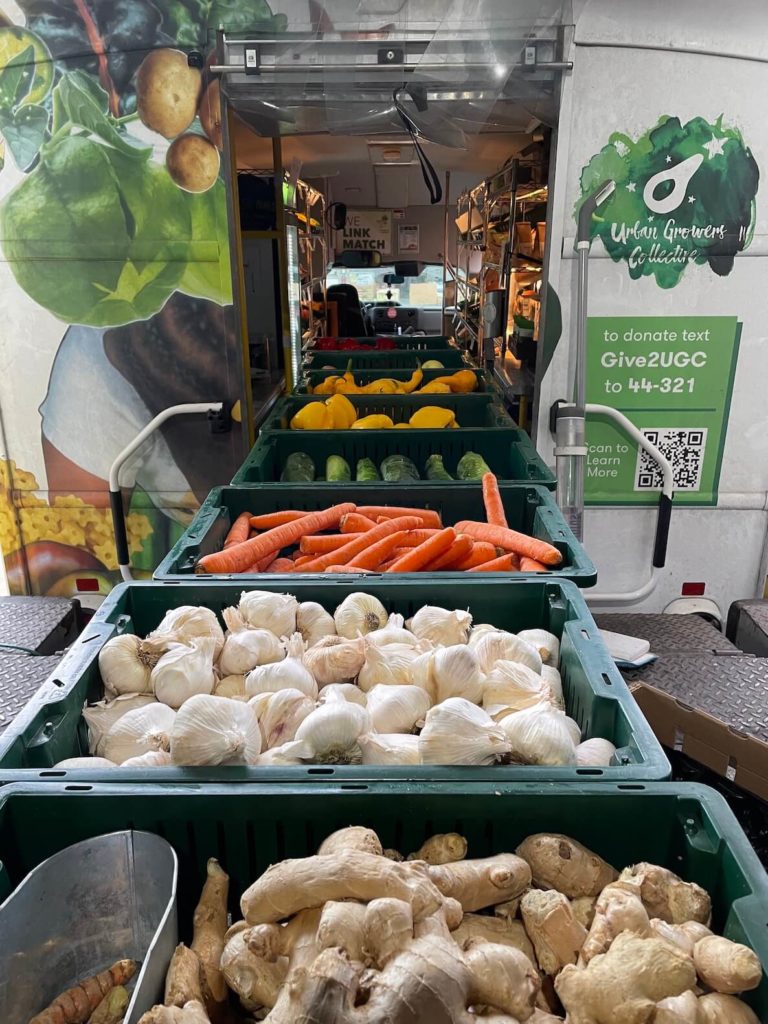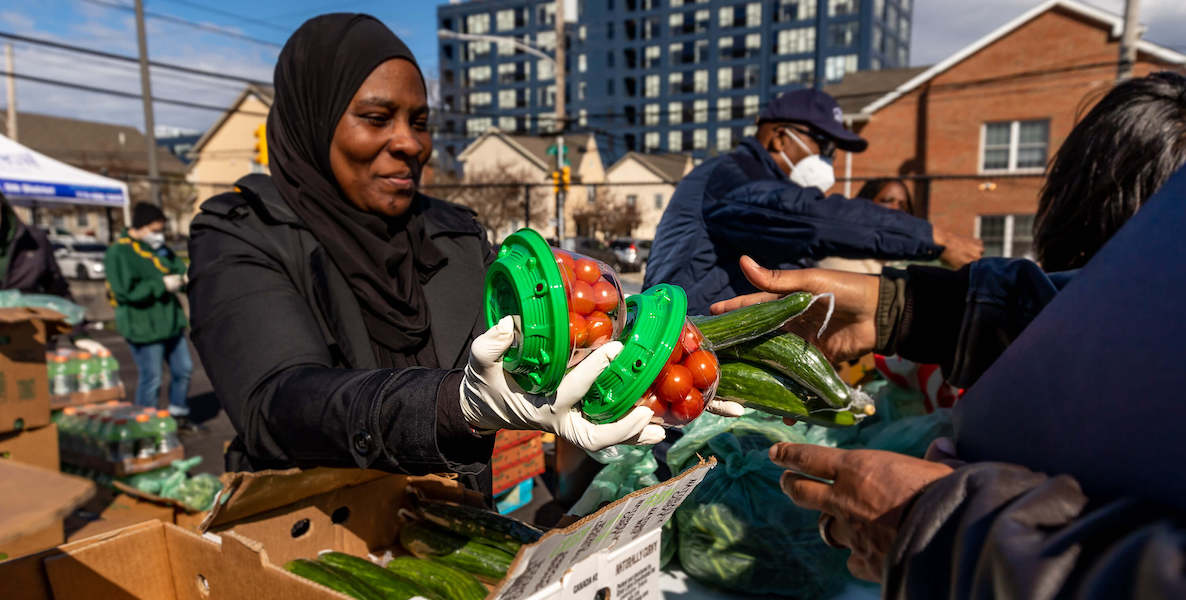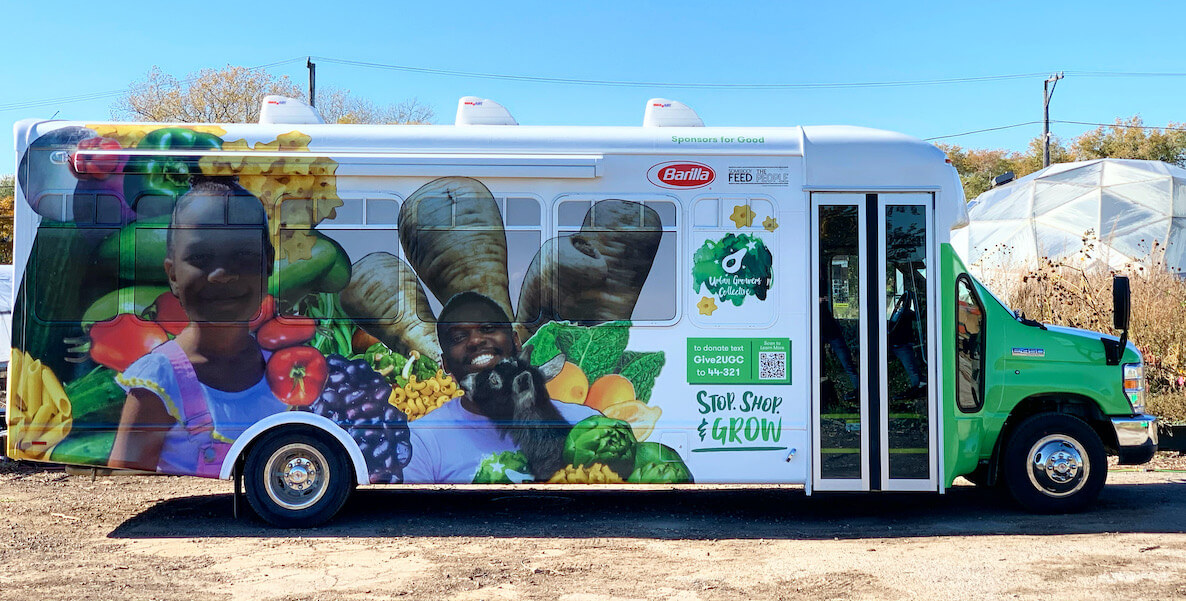The South and West sides of Chicago are, like many neighborhoods in Philadelphia, food deserts, areas that the U.S Department of Agriculture defines as having a poverty rate of at least 20 percent, and where at least a third of the population lives more than a mile from a supermarket or large grocery store.
Also like Philly, Chicago has its fair share of farmers markets—often in middle- and upper-class neighborhoods, at prices out of reach for people living in poverty. All of which contributes to health and healthcare disparities in a city where, according to a report earlier this year, there’s “one of the widest mortality rate gaps between Blacks and Whites among the top 30 largest cities in the country.” Whereas, nationwide, the Black mortality rate from 2009 to 2018 was 24 percent higher, in Chicago it was 65 percent higher.
RELATED: How you can help fight food insecurity in Philadelphia
“On the south and west sides of Chicago, in communities that are predominantly Black and Brown, we have a huge lack of fresh produce, and that is mostly from divestment in those neighborhoods,” explains Laurell Sims, co-founder and CEO of Urban Growers Collective. There’s an abundance of fast food and corner stores, she says, but big food retailers have stayed away. “Trying to open grocery stores and make them profitable is not something that folks feel like they can do. I don’t know if that’s necessarily true, but big retailers feel that way, and there’s definitely that perception that because it’s Black and Brown communities, there’s more violence. All of those different myths that we’ve created are part of the problem.”
“You can show up in a huge van with loads of veggies, but that doesn’t mean anybody’s gonna come. You have to work with folks in the neighborhood and really listen and be responsive,” says Sims.
That’s why, in 2014 Urban Growers Collective launched its Fresh Moves Mobile Market, which travels five days a week to 14 different Chicago locations—health clinics, schools, community centers, churches—to offer low-priced, culturally-relevant produce in that city’s most overlooked neighborhoods.
What’s more: Up to 70 percent of the produce the market sells is grown on 11 acres of urban farmland managed by Urban Growers Collective, a Black and women-led non-profit farm that provides hands-on job training and economic opportunities for youth and beginning farmers. Pre-Covid, they also had an adult job-training program, targeted in particular at young men at risk of gun violence. (That was put on hold because of frequent outbreaks of the virus.)
As the Collective says in its mission statement: “Our aim is to provide jobs while working to mitigate food insecurity and limited access to affordable, culturally-affirming, and nutritionally-dense food.
According to the group, in 2020, Urban Growers Collective funded and gave away 18,939 produce boxes, and coordinated and distributed an additional 19,632 USDA produce boxes (that they helped to design and curate, so that they were culturally-appropriate); combined, those 38,571 boxes weighed 1.15 million pounds, and contained whole produce that could be eaten raw or cooked at home.

Additionally, they funded 19,635 hot meals that were cooked with produce from their farms, forming partnerships with Chi-Fresh Kitchen and Centro de Trabajadores Unidos to cook these meals and distribute them to community partners and families, particularly seniors, those who are without homes, and those who struggled to cook on their own. Along the way, they harvested more than 18,000 pounds of produce and engaged 183 teens in the work, paying them $80,155 in stipends.
The Mobile Market actually started in 2012 as a City of Chicago venture with a $100,000 federal grant, with which the city converted two out-of-service Chicago Transit Authority (CTA) buses. After two years, when funding for the project dried up, the initiative was taken over by Urban Growers Collective. “We were at the point of expansion, and ready to have a larger impact in terms of food security [and] see if we could make it thrive,” Sims explains.
In part, Sims says, the city program was unsustainable because they bought all the produce for resale; through its farms, Urban Growers Collective grows about 70 percent of what it sells on the bus during the summer months. During winter months, they’re still able to grow spinach, kale, collard greens, carrots and some onions. Everything else the group buys from a women-owned wholesaler.
RELATED: The woman behind Philabundance Community Kitchen
The group has also updated its vehicle, thanks to the corporate sponsorship of pasta giant Barilla and additional funding from Somebody Feed Phil’s foundation. Now, instead of the former city buses, the mobile market relies on a more fuel-efficient airport shuttle-style vehicle that’s been retrofitted with beautiful lighting and shelves that maximize the space. A refrigerated truck travels behind the vehicle on its route, to enable restocking through the day.
Every shopper is given $10 worth of groceries for free, and the Market will match up to $25 in Illinois’ version of SNAP, which is called Link. That’s $60 worth of groceries—critical at a time when food scarcity has increased by about 150 percent during the pandemic. People are welcome to buy more on top of that if they’d like.
From January through August 2021 alone, the group distributed $100,460 in $10 free produce vouchers, and donated 3,635 in packed produce boxes and 4,076 hot meals (cooked by their partners at Chi Fresh Kitchen—a worker-owned co-op—using fresh produce from the farm).
Key to the program’s success has been not just meeting people where they are, but providing them with things they want. “We all love this idea of everything being local and seasonal, but that’s just not how people eat,” Sims says. “We have folks from all over the world who live in Chicago and have foods that speak to them culturally. If we want people eating fresh fruits and vegetables, then we have to have the fruits and vegetables that they love to eat.” That means being able to stock pineapples and bananas, which they have to purchase. During the pandemic, inventory was expanded to include other basics, like grains, toilet paper, and soap.

“Having choice is a huge piece of why the shopping experience is so nice,” Sims says. While the program pivoted to pre-packed boxes early in the pandemic, they’re grateful to have returned to the more traditional shopping program.
Funding comes from grants, foundations, corporate sponsors, fundraising, and educational workshops, which Urban Growers Collective holds on topics ranging from how to grow food to medicinal herbs to dismantling racism.
Similar threads underlie food relief efforts throughout Philadelphia, though none combine urban farming with mobile markets that have zero barriers to entry, as with Fresh Moves.
Take Sankofa Community Farm at Bartram’s Garden, which has a similar mission, albeit on a smaller scale: It’s a four-acre farm, tended to by about 20 paid high school interns; it produces and distributes more than 15,000 pounds of food annually, manages weekly neighborhood farm stands and grocery partnerships to sell its produce affordably and locally, distributes more than 80,000 vegetable transplants to over 130 farms and gardens around Philadelphia through the PHS City Harvest Program, and hosts more than 1,500 volunteers annually.
“We’re not going to change poverty levels if folks don’t have jobs and the money to be able to choose where they spend it,” Sims says.
Then, of course, there’s Philabundance, which, in addition to its other efforts, for the last year has been delivering healthy meals and produce to Health Partners Plans (HPP) members who identify as food insecure. And Thomas Jefferson University, through its recently announced “Closing the Gap” program with Novartis Pharmaceuticals Corp., says it’s working on figuring out how to get healthy foods to people via drone or InstaCart.
Steve Preston, chief program officer at Philly’s Share Food Program, says the closest financial equivalent to Fresh Moves is the Farmers Market Nutrition Program (FMNP) and its senior version, SFMNP, through which folks who are eligible for WIC or meet income guidelines can apply to get $24 to spend between June and November each year from Pennsylvania-grown food sold at registered farmers’ markets. But, he concedes, FMNP and SFMNP, like many government programs, have barriers to participation—namely a clunky paper application, and the requirement that farmers register as well.
RELATED: Philly institutions team up to offer $380,000 for food justice solutions
Preston’s particularly interested in how Fresh Moves Mobile Market’s solves the “last mile problem”, bringing food directly to where people are, instead of expecting them to retrieve it from an often inconvenient location. That said, his dream would be to skip this step and go right to home delivery, allowing people to order what they like via phone or the web, as if they were ordering through FreshDirect, and have items delivered to their doorstep. “That is the future of food-banking, in my opinion,” he says. “It checks every box—including dignity and convenience.”
Until then, Sims says that the key to making a program like this work in Philly, or anywhere else, is understanding the needs of the particular community.
“We just love people in general, and we recognize that one size does not fit all. Every community’s really different, and community feedback is key,” she says. Working with partners has also been critical. “You can show up in a huge van with loads of veggies, but that doesn’t mean anybody’s gonna come. You have to work with folks in the neighborhood and really listen and be responsive.”
She also acknowledges that as impactful as Fresh Moves has been, it’s not a panacea. “This bus is probably not a solution for every community,” she says. Food access is a multifaceted problem, requiring urban farms in different areas; farmers markets; and grocery stores. “We need all of these things to really make an impact on food accessibility.”
And a big piece of that is, of course, investment.
“We’re not going to change poverty levels if folks don’t have jobs and the money to be able to choose where they spend it,” she says. “Cities need to be responsive to communities, they need to invest in communities, and I think we see the biggest impact when we help provide jobs, we help provide green space, we help provide housing, and we create social structures that are stable.”

RELATED READS
Guest Commentary: Solve “The Lost Mile” for Hungry Philadelphians
Header photo by Laurell Sims





